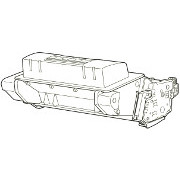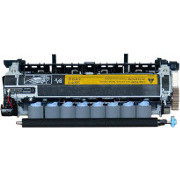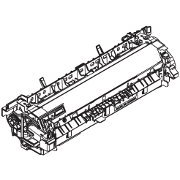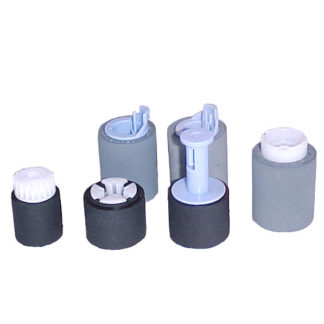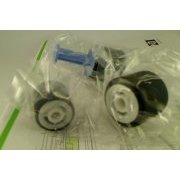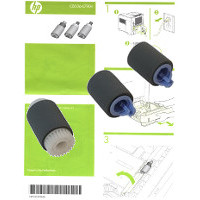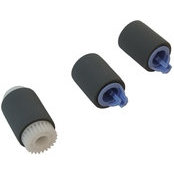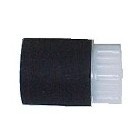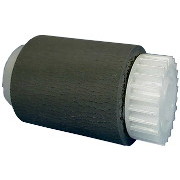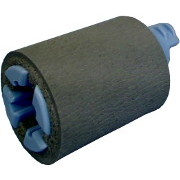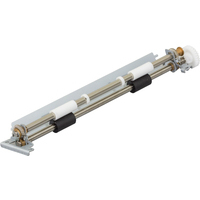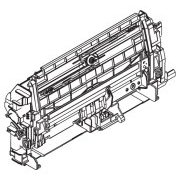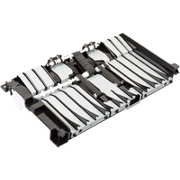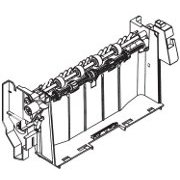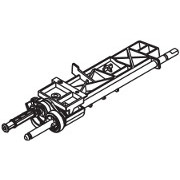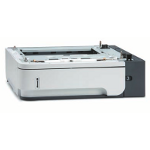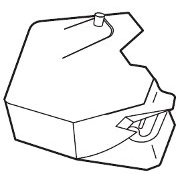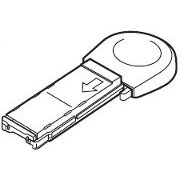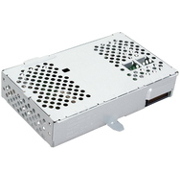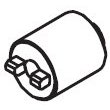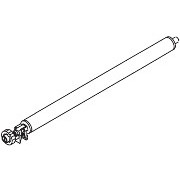HP Original Toners
Maintenance Kit
Fuser
Spares
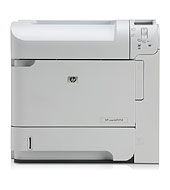
HP RM1-5460 Registration Assembly for P4014 Series Printers .
RM1-5460 is the registration assembly for P4014, P4015 and P4515 printers. Its job is to straighten, hold and then feed paper and other media comming from the printer trays and feed them in a closely controlled manner between the OPC drum in the cartridge and the transfer roller.
Part RM1-5460 is quite similar to the registration station used in the LaserJet 4200 series but with incremental improvements - that printer didn't have a separate drum-drive motor which the P4014 does. The Laserjet M601 series is different again. 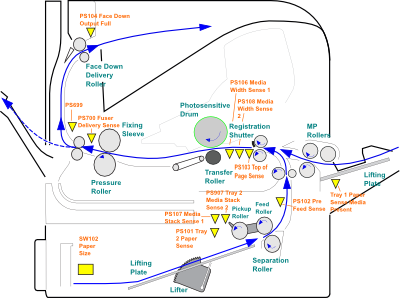
The registration assembly RM1-5460 is dominated by two rollers which will turn to feed paper forward between the OPC drum and the transfer roller.
The RM1-5460 rollers are driven by the drum motor to ensure a match in speed (?).
Paper arrives from the trays via either the lower feed rollers RM1-4527 or the MP tray feed roller pair. The first thing that happens to paper on registration is that it hits a sensor, then the registration shutter which at that time blocks the paper path. A moment later the paper feed clutch stops for a moment - paper can't pass through registration until the drum and laser scanner are working together to produce an image.
The registration shutter corrects any skew the paper might have aquired as it fed. The shutter is straight against the paper feed path. When paper hits it the shutter impedes it's passage until it is straight at which the shutter rotates out of the way. The feed clutch turns back on and the paper is driven foward by the registration rollers and feed rollers, gradually being taken over by the feed belts and then the fuser pressure roller.
One of the registration rollers is sometimes called the pre-transfer roller. Certainly it preceeds transfer but presumably HP mean a bit more by this, it may have a role in ensuring an even charge on media before it goes to the transfer station.
Fault Diagnosis
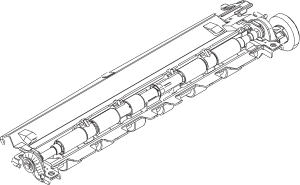
The RM1-5460 assembly might be suspect if paper is frequently skewed. One possibility is ridges developing in the plastic of things like the registration shutter through repeated contact with the leading edge of the paper. Someting similar happens earlier in the feed path on other printers.
The likely fault from registration not working properly is slightly skewed pages. It isn't very common, but nor is it unknown.
Experience suggests registration issues are quite difficult and annoying to deal with. The wear patterns that give issues are not always self evident.
Registration is preceeded by one set of rollers for paper feeding from tray 1 kit CB506-67905and two sets for paper from tray 2 kit CB506-67904 and RM1-4527. Only if both feed paths give the same problem and the problem is definitely not the other rollers would the registration station be suspect.
HP Supply InformationHP Partsurfer says (July 2013) ...
RM1-5460-000CN Registration assembly - Registration shutter and roller with holder frame assembly
... and lists the 10 printers in the P4014 family with the N, DN, TN and X variants. The RM1-5460 is the same in all these models.
The RM1-5460 is likely to be known by longer numbers RM1-5460-000 and RM1-5460-000CN. HP do not give part numbers suggesting any variant designs, however one distributor suggests RM1-5460-010CN exists.
EAN/UPC is 5704327456940.
Supply Situation
This is one of those parts that isn't wanted often but when there is a problem it will bring the job to a halt until a new one can be obtained.
The bad news is that there might not be any new stock in the UK so the part might be on 7-day delivery. The part probably can be sourced "refurbished" from decommissioned printers; however if there is a persistent wear pattern across all printers the new part may still be a problem.
This is a fairly significant part so it is priced around £25 This is just a guideline, our prices change with distribution lists - see the catalog . Stock numbers in the UK indicate there is not much call for the part.
Copyright G & J Huskinson & MindMachine Associates Ltd 2013, 2015, 2016. Some pictures derived from HP User and Service guides. These technical pages do not constitute an offer for sale; just our knowledge at the time of writing. See the catalog. Sales pages on this Web site use cookies to store user information. We also use Google Analytics to track site usage patterns.

